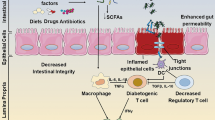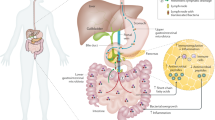Abstract
Pancreatic exocrine insufficiency (PEI) can be induced by various kinds of diseases, including chronic pancreatitis, acute pancreatitis, and post-pancreatectomy. The main pathogenetic mechanism of PEI involves the decline of trypsin synthesis, disorder of pancreatic fluid flow, and imbalance of secretion feedback. Animal studies have shown that PEI could induce gut bacterial overgrowth and dysbiosis, with the abundance of Lactobacillus and Bifidobacterium increasing the most, which could be partially reversed by pancreatic enzyme replacement therapy. Clinical studies have also confirmed the association between PEI and the dysbiosis of gut microbiota. Pancreatic exocrine secretions and changes in duodenal pH as well as bile salt malabsorption brought about by PEI may affect and shape the abundance and composition of gut microbiota. In turn, the gut microbiota may impact the pancreatic exocrine acinus through potential bidirectional crosstalk. Going forward, more and higher-quality studies are needed that focus on the mechanism underlying the impact of PEI on the gut microbiota.
摘要
胰腺外分泌功能不全(PEI)可由多种疾病引起,包括慢性胰腺炎、急性胰腺炎、胰腺切除术后等。PEI其主要发病机制与胰蛋白酶合成下降、胰液流动紊乱、分泌反馈失衡有关。动物研究表明:PEI可诱导肠道细菌过度生长和生态失调,其中乳杆菌和双歧杆菌的丰度增加最为多见;肠道细菌过度生长和生态失调可通过胰酶替代治疗得到部分逆转。临床研究也证实PEI与肠道菌群失调之间存在关联。胰脏外分泌水**的下降,伴随PEI产生的十二指肠pH值的改变,以及PEI引起的胆盐吸收不良,这可能是PEI导致肠道菌群丰度和组成发生改变的潜在作用机制。反之,肠道微生物群也可能通过潜在的双向调节影响胰腺外分泌腺泡的功能。展望未来,仍需要更多的高质量研究来揭示胰腺外分泌不足对肠道微生物群影响的机制。
Similar content being viewed by others
References
Adolph TE, Mayr L, Grabherr F, et al., 2019. Pancreas-microbiota cross talk in health and disease. Annu Rev Nutr, 39:249–266. https://doi.org/10.1146/annurev-nutr-082018-124306
Ahuja M, Schwartz DM, Tandon M, et al., 2017. Orai1-mediated antimicrobial secretion from pancreatic acini shapes the gut microbiome and regulates gut innate immunity. Cell Metab, 25(3):635–646. https://doi.org/10.1016/j.cmet.2017.02.007
Blake AB, Guard BC, Honneffer JB, et al., 2019. Altered microbiota, fecal lactate, and fecal bile acids in dogs with gastrointestinal disease. PLoS ONE, 14(10):e0224454. https://doi.org/10.1371/journal.pone.0224454
Buckland AG, Heeley EL, Wilton DC, 2000. Bacterial cell membrane hydrolysis by secreted phospholipases A2: a major physiological role of human group IIa sPLA2 involving both bacterial cell wall penetration and interfacial catalysis. Biochim Biophys Acta Mol Cell Biol Lipids, 1484(2–3):195–206. https://doi.org/10.1016/s1388-1981(00)00018-4
Campo L, Eiseler S, Apfel T, et al., 2019. Fatty liver disease and gut microbiota: a comprehensive update. J Clin Transl Hepatol, 7(1):56–60. https://doi.org/10.14218/JCTH.2018.00008
Casellas F, Guarner L, Vaquero E, et al., 1998. Hydrogen breath test with glucose in exocrine pancreatic insufficiency. Pancreas, 16(4):481–486. https://doi.org/10.1097/00006676-199805000-00004
Chairatana P, Chu HT, Castillo PA, et al., 2016. Proteolysis triggers self-assembly and unmasks innate immune function of a human α-defensin peptide. Chem Sci, 7(3): 1738–1752. https://doi.org/10.1039/C5SC04194E
Dermadi D, Valo S, Ollila S, et al., 2017. Western diet deregulates bile acid homeostasis, cell proliferation, and tumorigenesis in colon. Cancer Res, 77(12):3352–3363. https://doi.org/10.1158/0008-5472.CAN-16-2860
Duncan SH, Louis P, Thomson JM, et al., 2009. The role of pH in determining the species composition of the human colonic microbiota. Environ Microbiol, 11(8):2112–2122. https://doi.org/10.1111/j.1462-2920.2009.01931.x
Dutta SK, Anand K, Gadacz TR, 1986. Bile salt malabsorption in pancreatic insufficiency secondary to alcoholic pancreatitis. Gastroenterology, 91(5):1243–1249. https://doi.org/10.1016/s0016-5085(86)80023-3
Forsmark CE, 2018. Diagnosis and management of exocrine pancreatic insufficiency. Curr Treat Options Gastroenterol, 16(3):306–315. https://doi.org/10.1007/s11938-018-0186-y
Frost F, Kacprowski T, Rühlemann M, et al., 2019. Impaired exocrine pancreatic function associates with changes in intestinal microbiota composition and diversity. Gastroenterology, 156(4):1010–1015. https://doi.org/10.1053/j.gastro.2018.10.047
Frost F, Weiss FU, Sendler M, et al., 2020. The gut microbiome in patients with chronic pancreatitis is characterized by significant dysbiosis and overgrowth by opportunistic pathogens. Clin Transl Gastroenterol, 11(9):e00232. https://doi.org/10.14309/ctg.0000000000000232
Girdhar K, Soto M, Huang Q, et al., 2022. Gut microbiota regulate pancreatic growth, exocrine function, and gut hormones. Diabetes, 71(5):945–960. https://doi.org/10.2337/db21-0382
Hollemans RA, Hallensleben NDL, Mager DJ, et al., 2018. Pancreatic exocrine insufficiency following acute pancreatitis: systematic review and study level meta-analysis. Pancreatology, 18(3):253–262. https://doi.org/10.1016/j.pan.2018.02.009
Huan CM, Kim D, Ou PQ, et al., 2016. Mechanisms of interleukin-22’s beneficial effects in acute pancreatitis. World J Gastrointest Pathophysiol, 7(1): 108–116. https://doi.org/10.4291/wjgp.v7.i1.108
Iovanna J, Frigerio JM, Dusetti N, et al., 1993. Lithostathine, an inhibitor of CaCO3, crystal growth in pancreatic juice, induces bacterial aggregation. Pancreas, 8(5):597–601. https://doi.org/10.1097/00006676-199309000-00011
Isaiah A, Parambeth JC, Steiner JM, et al., 2017. The fecal microbiome of dogs with exocrine pancreatic insufficiency. Anaerobe, 45:50–58. https://doi.org/10.1016/j.anaerobe.2017.02.010
Keller J, Layer P, 2005. Human pancreatic exocrine response to nutrients in health and disease. Gut, 54(S6):vi1–vi28. https://doi.org/10.1136/gut.2005.065946
Kempeneers MA, Ali UA, Issa Y, et al., 2020. Natural course and treatment of pancreatic exocrine insufficiency in a nationwide cohort of chronic pancreatitis. Pancreas, 49(2): 242–248. https://doi.org/10.1097/MPA.0000000000001473
Kościuczuk EM, Lisowski P, Jarczak J, et al., 2012. Cathelicidins: family of antimicrobial peptides. A review. Mol Biol Rep, 39(12):10957–10970. https://doi.org/10.1007/s11033-012-1997-x
Lee AA, Baker JR, Wamsteker EJ, et al., 2019. Small intestinal bacterial overgrowth is common in chronic pancreatitis and associates with diabetes, chronic pancreatitis severity, low zinc levels, and opiate use. Am J Gastroenterol, 114(7):1163–1171. https://doi.org/10.14309/ajg.0000000000000200
Lembcke B, Kraus B, Lankisch PG, 1985. Small intestinal function in chronic relapsing pancreatitis. Hepatogastroenterology, 32(3):149–151.
Li QR, Wang CY, Tang C, et al., 2013. Bacteremia in patients with acute pancreatitis as revealed by 16S ribosomal RNA gene-based techniques. Crit Care Med, 41(8): 1938–1950. https://doi.org/10.1097/CCM.0b013e31828a3dba
Löhr JM, Oliver MR, Frulloni L, 2013. Synopsis of recent guidelines on pancreatic exocrine insufficiency. United European Gastroenterol J, 1(2):79–83. https://doi.org/10.1177/2050640613476500
Lu WW, Chen X, Ni JL, et al., 2021. The role of gut microbiota in the pathogenesis and treatment of acute pancreatitis: a narrative review. Ann Palliat Med, 10(3):3445–3451. https://doi.org/10.21037/apm-21-429
Madsen JL, Graff J, Philipsen EK, et al., 2003. Bile acid malabsorption or disturbed intestinal permeability in patients treated with enzyme substitution for exocrine pancreatic insufficiency is not caused by bacterial overgrowth. Pancreas, 26(2):130–133. https://doi.org/10.1097/00006676-200303000-00007
McCarl CA, Picard C, Khalil S, et al., 2009. ORAI1 deficiency and lack of store-operated Ca2+ entry cause immunodeficiency, myopathy, and ectodermal dysplasia. J Allergy Clin Immunol, 124(6): 1311–1318.e7. https://doi.org/10.1016/j.jaci.2009.10.007
Nie YF, Hu J, Yan XH, 2015. Cross-talk between bile acids and intestinal microbiota in host metabolism and health. J Zhejiang Univ-Sci B (Biomed & Biotechnol), 16(6):436–446. https://doi.org/10.1631/jzus.B1400327
Nishiyama H, Nagai T, Kudo M, et al., 2018. Supplementation of pancreatic digestive enzymes alters the composition of intestinal microbiota in mice. Biochem Biophys Res Commun, 495(1):273–279. https://doi.org/10.1016/j.bbrc.2017.10.130
Petrov MS, 2019. Metabolic trifecta after pancreatitis: exocrine pancreatic dysfunction, altered gut microbiota, and new-onset diabetes. Clin Transl Gastroenterol, 10(10): e00086. https://doi.org/10.14309/ctg.0000000000000086
Pietzner M, Budde K, Rühlemann M, et al., 2021. Exocrine pancreatic function modulates plasma metabolites through changes in gut microbiota composition. J Clin Endocrinol Metab, 106(5):e2290–e2298. https://doi.org/10.1210/clinem/dgaa961
Qin JJ, Li RQ, Raes J, et al., 2010. A human gut microbial gene catalogue established by metagenomic sequencing. Nature, 464(7285):59–65. https://doi.org/10.1038/nature08821
Reijnders D, Goossens GH, Hermes GDA, et al., 2016. Effects of gut microbiota manipulation by antibiotics on host metabolism in obese humans: a randomized doubleblind placebo-controlled trial. Cell Metab, 24(1):63–74. https://doi.org/10.1016/j.cmet.2016.06.016
Ritz S, Hahn D, Wami HT, et al., 2020. Gut microbiome as a response marker for pancreatic enzyme replacement therapy in a porcine model of exocrine pancreas insufficiency. Microb Cell Fact, 19:221. https://doi.org/10.1186/s12934-020-01482-2
Sand J, Nordback I, 2009. Acute pancreatitis: risk of recurrence and late consequences of the disease. Nat Rev Gastroenterol Hepatol, 6(8):470–477. https://doi.org/10.1038/nrgastro.2009.106
Seekatz AM, Schnizlein MK, Koenigsknecht MJ, et al., 2019. Spatial and temporal analysis of the stomach and small-intestinal microbiota in fasted healthy humans. mSphere, 4(2):e00126–19. https://doi.org/10.1128/mSphere.00126-19
Sekirov I, Russell SL, Antunes LCM, et al., 2010. Gut microbiota in health and disease. Physiol Rev, 90(3):859–904. https://doi.org/10.1152/physrev.00045.2009
Seroussi E, Blum SE, Krifucks O, et al., 2018. Application of pancreatic phospholipase A2 for treatment of bovine mastitis. PLoS ONE, 13(8):e0203132. https://doi.org/10.1371/journal.pone.0203132
Shao JW, Ge TT, Chen SZ, et al., 2021. Role of bile acids in liver diseases mediated by the gut microbiome. World J Gastroenterol, 27(22):3010–3021. https://doi.org/10.3748/wjg.v27.i22.3010
Shin JH, Seeley RJ, 2019. Reg3 proteins as gut hormones? Endocrinology, 160(6):1506–1514. https://doi.org/10.1210/en.2019-00073
Sileikiene V, Mosenthin R, Tafaj M, et al., 2005. Effect of short chain fatty acids infused intraileally on interdigestive exocrine pancreatic secretions in growing pigs. J Anim Physiol Anim Nutr (Berl), 89(7–8): 253–259. https://doi.org/10.1111/j.1439-0396.2005.00511.x
Simpson KW, Batt RM, Jones D, et al., 1990. Effects of exocrine pancreatic insufficiency and replacement therapy on the bacterial flora of the duodenum in dogs. Am J Vet Res, 51(2):203–206.
Sun J, Furio L, Mecheri R, et al., 2015. Pancreatic β-cells limit autoimmune diabetes via an immunoregulatory antimicrobial peptide expressed under the influence of the gut microbiota. Immunity, 43(2):304–317. https://doi.org/10.1016/j.immuni.2015.07.013
Tan CC, Ling ZX, Huang Y, et al., 2015. Dysbiosis of intestinal microbiota associated with inflammation involved in the progression of acute pancreatitis. Pancreas, 44(6): 868–875. https://doi.org/10.1097/MPA.0000000000000355
Thomas PD, Forbes A, Green J, et al., 2003. Guidelines for the investigation of chronic diarrhoea, 2nd edition. Gut, 52(S5):v1–v15. https://doi.org/10.1136/gut.52.suppl_5.v1
Thomas RM, Jobin C, 2020. Microbiota in pancreatic health and disease: the next frontier in microbiome research. Nat Rev Gastroenterol Hepatol, 17:53–64. https://doi.org/10.1038/s41575-019-0242-7
Tilg H, Adolph TE, 2017. Beyond digestion: the pancreas shapes intestinal microbiota and immunity. Cell Metab, 25(3):495–496. https://doi.org/10.1016/j.cmet.2017.02.018
Trespi E, Ferrieri A, 1999. Intestinal bacterial overgrowth during chronic pancreatitis. Curr Med Res Opin, 15(1):47–52. https://doi.org/10.1185/03007999909115173
Vanga RR, Tansel A, Sidiq S, et al., 2018. Diagnostic performance of measurement of fecal elastase-1 in detection of exocrine pancreatic insufficiency: systematic review and meta-analysis. Clin Gastroenterol Hepatol, 16(8):1220–1228.e4. https://doi.org/10.1016/j.cgh.2018.01.027
Westermarck E, Myllys V, Aho M, 1993. Effect of treatment on the jejunal and colonic bacterial flora of dogs with exocrine pancreatic insufficiency. Pancreas, 8(5):559–562. https://doi.org/10.1097/00006676-199309000-00005
Working Party of the Australasian Pancreatic Club, 2016. Summary and recommendations from the Australasian guidelines for the management of pancreatic exocrine insufficiency. Pancreatology, 16(2):164–180. https://doi.org/10.1016/j.pan.2015.12.006
Zarrinpar A, Chaix A, Yooseph S, et al., 2014. Diet and feeding pattern affect the diurnal dynamics of the gut microbiome. Cell Metab, 20(6):1006–1017. https://doi.org/10.1016/j.cmet.2014.11.008
Zhang ZW, Tanaka I, Pan Z, et al., 2022. Intestinal homeostasis and inflammation: gut microbiota at the crossroads of pancreas-intestinal barrier axis. Eur J Immunol, 52(7): 1035–1046. https://doi.org/10.1002/eji.202149532
Zhou CH, Meng YT, Xu JJ, et al., 2020. Altered diversity and composition of gut microbiota in Chinese patients with chronic pancreatitis. Pancreatology, 20(1):16–24. https://doi.org/10.1016/j.pan.2019.11.013
Acknowledgments
This work was supported by the Construction Project of Clinical Advanced Subjects of Capital Medical University (No. 1192070312), the Bei**g Municipal Science & Technology Commission (Nos. Z171100001017077 and Z191100006619038), the Capital Health Research and Development of Special (No. 2020-1-2012), and the Capital Medical University Youth Science Foundation (No. PTZ21035), China.
Author information
Authors and Affiliations
Contributions
Yulin GUO designed the conception, performed the study searching and interpretation, drafted the manuscript, and revised the final manuscript. Feng CAO performed the study searching and interpretation, supervised, and revised the final manuscript. Fei LI designed the conception, supervised, and revised the final manuscript. All authors have read and approved the final manuscript, and therefore, agreed to be responsible for the research integrity and for all aspects of the work.
Corresponding author
Ethics declarations
Yulin GUO, Feng CAO, and Fei LI declare that they have no conflict of interest.
This article does not contain any studies with human or animal subjects performed by any of the authors.
Rights and permissions
About this article
Cite this article
Guo, Y., Cao, F. & Li, F. Impacts of pancreatic exocrine insufficiency on gut microbiota. J. Zhejiang Univ. Sci. B 25, 271–279 (2024). https://doi.org/10.1631/jzus.B2300070
Received:
Accepted:
Published:
Issue Date:
DOI: https://doi.org/10.1631/jzus.B2300070




